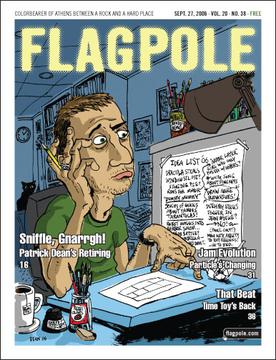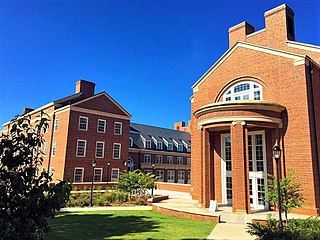Related Research Articles

Emory University is a private research university in Atlanta, Georgia, United States. It was founded in 1836 as Emory College by the Methodist Episcopal Church and named in honor of Methodist bishop John Emory. Its main campus is in Druid Hills, three miles from downtown Atlanta.

The George Foster Peabody Awards program, named for the American businessman and philanthropist George Peabody, honor what are described as the most powerful, enlightening, and invigorating stories in all of television, radio, and online media. Because of their academic affiliation and reputation for discernment, the awards are held in high esteem within the media industry.

Athens is a consolidated city-county in the U.S. state of Georgia. Downtown Athens lies about 70 miles (110 km) northeast of downtown Atlanta. The University of Georgia, the state's flagship public university and an R1 research institution, is in Athens and contributed to its initial growth. In 1991, after a vote the preceding year, the original City of Athens abandoned its charter to form a unified government with Clarke County, referred to jointly as Athens–Clarke County where it is the county seat.

The University of Georgia is a public land-grant research university with its main campus in Athens, Georgia, United States. Chartered in 1785, it is the oldest public university in the United States. It is the flagship school of the University System of Georgia.

The University of Georgia School of Law is the law school of the University of Georgia, a public research university in Athens, Georgia. It was founded in 1859, making it one of the oldest American university law schools in continuous operation. Georgia Law accepted 14.77% of applicants for the class entering in 2023.
Boston College Law School is the law school of Boston College, a private Jesuit research university in Chestnut Hill, Massachusetts. It is situated on a 40-acre (160,000 m2) campus in Newton, Massachusetts, about 1.5 miles (2.4 km) from the university's main campus in Chestnut Hill.

The Technique, also known as the "'Nique", is the official student newspaper of the Georgia Institute of Technology in Atlanta, Georgia, and has referred to itself as "the South's liveliest college newspaper" since 1945. As of the fall semester of 2011, the Technique has a weekly circulation of 10,000, distributed to numerous locations on the Georgia Tech campus and a handful of locations in the surrounding area. The first issue of the Technique was published on November 17, 1911, and the paper has printed continuously since its founding. The paper publishes weekly throughout the regular school year and primarily covers news, events and issues specific to the Georgia Tech community. In 2004 it was one of 25 collegiate newspapers to receive the Pacemaker award from the Associated Collegiate Press.

Saint Anselm College is a private Benedictine liberal arts college mostly in Goffstown, New Hampshire. Founded in 1889, it is named after Saint Anselm of Canterbury. As of 2024, the college's enrollment was 2,094 students.

The Phi Kappa Literary Society is a college literary society, located at the University of Georgia in Athens, Georgia, and is one of the few active literary societies left in America. Originally founded in 1820, the society has disbanded several times and was and most recently refounded in 1991, remaining active since. It continues to hold regular meetings at Phi Kappa Hall on the University of Georgia's North Campus. The Phi Kappa Literary Society holds formal debates and a forum for creative writings and orations as well as poetry.

Flagpole Magazine, often abbreviated to simply Flagpole, is an American alternative newsweekly that focuses on the cultural and political scene of Athens, Georgia, home to the University of Georgia, and its surrounding communities. It was founded by Jared Bailey and Dennis Greenia in 1987; it is currently published by Alicia Nickles and co-owned by Nickles and Pete McCommons. Publishing under the banner "Colorbearer of Athens, Georgia," Flagpole covers local events like the Wild Rumpus Halloween Parade, AthFest Music Fest, and the Athens Twilight Criterium. The publication covers politics, art, theater, movies, books, food, local comics, and advice columns in Athens and surrounding areas.

The Red & Black is an independent weekly student newspaper serving the University of Georgia (UGA), updated daily on its website.

Colleen McEdwards is a Canadian-American journalist and educator. She reported for CBC News for 10 years and CNN International for 16 years. After suffering from debilitating vertigo, she left broadcasting and earned a PhD in Education in 2012, and has taught at the University of Florida, Georgia State University, and as an adjunct professor for two semesters at the University of North Alabama.

The C. Herman and Mary Virginia Terry College of Business is a constituent college of the University of Georgia, a research university in Athens, Georgia, United States. The business college offers undergraduate programs, MBA programs, specialized master's programs, and doctoral programs. It was founded as the first business school in the American South in 1912.
CD Publications began as a news service firm located in Silver Spring, Maryland, outside Washington, D.C. It produces web-based news services and newsletters, whose topics of coverage include housing, health care, education, funding, aging and Native Americans.
The University of Oregon has a diverse array of student-run and non-student-run media outlets.

IUPUI University Library is the university library of Indiana University–Purdue University Indianapolis. IUPUI is an urban campus of Indiana University and Purdue University in Indianapolis, Indiana, United States. Indiana University is the managing partner.
John Joseph Powers was an American food scientist who was involved in the creation of the Food Science Department at University of Georgia in Athens, GA. He also served as President of the Institute of Food Technologists (IFT) in 1986-87 and was Editor of the Journal of Food Science and Journal of Food Quality.
Diane Marie Amann is Regents' Professor of International Law and holds the Emily & Ernest Woodruff Chair in International Law at the University of Georgia School of Law. During the autumn 2024 Michaelmas Term, she is in the United Kingdom, serving as Research Visitor at the Faculty of Law, University of Oxford Bonavero Institute of Human Rights and as a Visiting Fellow at Exeter College, Oxford.
The University of Georgia Computer Science Major is part of the UGA School of Computing, formerly known as the Computer Science Department. It operates under the joint administration of the Franklin College of Arts and Sciences and the University of Georgia College of Engineering. This restructuring occurred due to the rapid growth in the computer science major at the University of Georgia. While the original Computer Science department was established in 1984, the School of Computing was established on July 1, 2022.
The University of Georgia's main campus sits across from the college town of Athens, Georgia, whose dominant architectural themes are Federal—the older buildings—and Classical and Antebellum style. The university is home to the University of Georgia Campus Arboretum.
References
- ↑ "Georgia Political Review Publisher Publications". GPR via Issuu . Retrieved February 8, 2024.
- ↑ "Mission & History – Georgia Political Review". Archived from the original on March 28, 2012. Retrieved February 8, 2024.
- ↑ "- UGA Involvement Network". uga.campuslabs.com. Retrieved February 8, 2024.
- ↑ "Student Organizations -". spia.uga.edu. Retrieved February 8, 2024.
- ↑ "Main Library & McBay Science Library - Politics - Georgia Political Review". guides.libs.uga.edu. University of Georgia Libraries. Retrieved February 9, 2024.
- ↑ Review, Georgia Political. "About - The GPR Digest". gprdigest.substack.com. Retrieved February 8, 2024.
- ↑ Hurley, Sam (October 26, 2023). "PHOTOS: The Great Debate". The Red & Black. Retrieved February 8, 2024.
